- Home
- Anna Kavan
Let Me Alone Page 5
Let Me Alone Read online
Page 5
But after lunch she came in and shut the door after her with a definite sneck which seemed to shut out all the rest of the world.
‘There! I think I deserve a little rest now,’ she said, and sat down quite close to Anna.
The room glowed like a jewel in the dull breast of the day. They seemed shut away there, together, in absolute seclusion in the bright, warm room. Anna felt a little uneasy; rather alarmed at being shut up alone with the bright-eyed, assertive woman in her dark velvet dress – the goddess woman. She sat up on the sofa, very straight against the cushions, with her fine, slender brown hands motionless in her lap, and her head well up; on the defensive.
Rachel took a cigarette from a cedarwood box, and lit it.
‘Does it shock you to watch me smoke?’ she said. ‘I’m afraid I’m a very unprofessional sort of school-marm really.’
She blew out a fine stream of smoke, and smiled very winningly at Anna, as at an equal.
‘I like it,’ said Anna quietly.
She sat still, watching the thin, bluish feather of smoke curl upwards from the cigarette. It was blue as it left the cigarette, and greyish when Rachel blew it in a soft, cloudy stream from her red mouth. There was rather a long silence.
‘Well, how do you like us all?’ Rachel asked suddenly, darting her quick, hazel eyes at Anna above the smoke. But she saw that Anna was confused, and immediately altered the form of the question.
‘How do you think you will like being at Haddenham?’
Anna was relieved. She could answer that, all right.
‘I like it much better than Lausanne. Oh, very much better,’ she answered, and her mouth gave a little smile.
But she couldn’t help wondering, rather, what it was all about; what Rachel was getting at. A sort of misgiving lurked in her grey-blue eyes. And she sat up very straight and still, such a suspicious, haughty soul in her thin girl’s body.
‘What is it? What is the matter with you?’ Rachel asked her, with her soft, Madonna-fondness.
She threw away her cigarette and knelt beside the sofa, taking Anna’s hand caressively, covering that small, reluctant hand completely with her own large, soft, white hand. It was evident that she really loved Anna at that moment, was carried away in a muse of pitying Madonna-love. She really wanted to help her.
‘Why are you so suspicious? Why do you want to drive me away? What is it that frightens you?’
The questions dropped from her soft mouth with a gentle, crooning sound. Anna looked in wonder at the big, short-sighted hazel eyes peering close into her own. Hitherto the world had been united to repress her, to insult and humiliate her, to make her feel ashamed and unimportant. The world had made her feel an outcast, a dweller in outer darkness. She had known what it was to sink lower and lower, till there seemed no place for her in all the universe.
Now the opposite was happening. This vivid, splendid woman was trying to raise her up, to save her from the bitterness of the insults she had received, to restore to her the pride and beauty of herself. And suddenly it seemed as though a light had fallen upon her: as sometimes in the mountains when all the sky was threatening and gloomy with dark cloud, a slender ray of sunshine would come through, unexpectedly, brightening the sad earth.
‘I thought everybody must despise me; because I’m different, somehow. I don’t know why –’ Her voice trailed off uncertainly.
Rachel looked into her eyes for a moment, and her face seemed to go softer, warmer, melting away in a fusion of pitying love. She took Anna in her warm arms.
‘Poor little foreigner. Poor little lost girl,’ she murmured, very low, as if speaking to herself.
Anna relaxed against her, feeling that something new and wonderful had happened, changing the whole aspect of the world. It was the first time since the day of poor Miss Wilson, almost the first time in her life, that anyone had embraced her with real affection. Her heart grew lighter. But at the back of her mind, a faint, ironical self-consciousness would not be banished entirely, so that she was glad when Rachel released her and sat back again on her chair, a little way off.
But what a dominant will the full, queenly woman had! She had an almost uncanny power to make Anna feel confident and strong. The smooth head of the girl poised more surely. She was coming back to herself.
Then Rachel began to talk, not emotionally now, but very kindly, with a subtle flattery of intimacy, and a certain matter-of-factness that banished all alarms.
‘Things have gone wrong with you,’ she said. ‘You’ve lost yourself a bit. But it doesn’t really matter very much. There’s nothing fundamentally wrong, nothing that we shan’t be able to put right. The great thing is not to be afraid.’
Anna sat still, listening, and at the sound of those confident and consoling words, the nightmare, the threatening nightmare that had crept into her daily life, began to slink away. She looked out of the window, and saw the trees, rank upon bare rank, naked and motionless against the naked winter sky. Only by some freak of the wind, a single tree, a young chestnut, a tall sapling on which the dark buds were already distinguishable, blew strongly to and fro with a slow, even motion, like the rolling of a boat at sea. And ever after, through her stormy life, the recollection of those comforting words must be associated with the stormily swaying tree, swinging and rolling against the motionless background of the other trees which the wind left untouched.
‘You must never be afraid of anything,’ said Rachel Fielding. ‘Always remember that with your intelligence you can do anything you like. There is no such thing as an insurmountable obstacle. The world is there for you to do as you like with – not the other way round.’
‘But why is it that I feel so much alone? So cut off from everybody? As though I can never come near?’ Anna asked, after a pause.
The eager, penetrating, sensitive eyes of the other woman looked at her, looked into her soul, it seemed, and smiled their reassurance.
‘You’ve got to put up with that, Anna-Marie. You’ve got to get used to it, because its inevitable. You might even be a little proud of it, perhaps. All brilliant minds, all exceptional minds, have to stand alone. You see, they’ve outgrown the herd-mind, the ordinary intelligence of their fellows. And you are brilliant, my dear, though you don’t realize it yet. You’ve got to pay the penalty of brilliance; and after all it has its compensations too.’
She stopped and looked out into the distance, absently, as if seeking something far away. Then the smile came, the vivid, loving, protective, goddess-smile on her face, the understanding glisten in her hazel eyes, as she said:
‘And there’s usually someone who understands, more or less. You won’t be absolutely isolated like a stylite on your little pillar of superiority. Now, for instance, while you’re here, you can always talk to me.’
So the friendship was started between them. The friendship between the clever, intense woman, with her feminine strength and softness, and her rather beautiful, lavish maturity, her goddess-ship: and Anna, the pale, slight girl with her quiet gravity, and her masculine quality of detachment, her wild, uncaptured, virgin aloofness, that turned so easily to hardness and frigidity.
Anna was a little shy at first, a little doubtful. Her innate scepticism made her stand off from the proffered affection. She was somewhat suspicious, seeing the big white arms of Rachel wide open to receive her: as though it were some sort of a trap. But she had suffered fear and humiliation at the hands of the world; the world had brought the creeping nightmare into her life. And Rachel had saved her, Rachel had driven away the nightmare. So she must love Rachel in the end. She had to feel an almost passionate gratitude to this woman who had restored her pride in herself.
It was in the summer that the friendship ripened. In spring-time the flat country that through the long winter had seemed bleak and dreary under the perpetual beating of the rain or the sharp-edged dryness of the frost, became soothed and beautiful. The gentle English spring laid a softening veil over the land. The hedges burned with a lon
g white fire of blackthorn, the fruit trees flowered in a light-hearted way, like girls standing in full-skirted dresses, pink and white, multitudes of small, gay flowers twinkled in the grass, the sky was a pale, pale blue. And over everything the green was stealing, the very delicate, tender first green, like the softest, downy feathers on a bird’s breast.
Anna walked often with Rachel through the bright fields.
‘I’d no idea it could be so beautiful here, so soft and flowery,’ she said.
She had thought of Haddenham as a harsh, cold place, cheerless and dank. Now suddenly, a softness had come over it, a benevolence. And Anna too felt softened and comforted.
Rachel was now the centre of her life. Other people, the other girls who thronged the surface of her everyday life, were dim and vague, phantom-like, inconspicuous, almost invisible. She took no heed of them. Rachel was the only reality. The big, magnificent woman filled her life. They were constantly together. Whenever Rachel could get away from her busy-ness, from the countless preoccupations and duties of her position, she came back to Anna. It was almost as if she got something from her; as if she derived some secret strength or encouragement from the thin, proud, pale-skinned girl.
And Anna was happy. For the first time in her life she could talk openly of the things which interested her and were important to her. She had a great need of speech, of putting her thoughts into words; otherwise her thoughts seemed to escape her, flying about her brain in a wild confusion. It needed the power of words to put them in their places. And Rachel was full of understanding, using her sensitiveness to fan the thoughts of Anna towards coherency.
She gave Anna self-confidence. This was what she wanted to do. For the moment this was her métier, this exaltation of the strange little creature who had come so near to losing the sense of her own value. As a goddess, she wanted to save Anna, to have her as a protégée: and as a woman she wanted her for a friend. With her mysterious feminine will she enveloped Anna most completely. She had the most curious power in the world of making Anna feel confident and strong. She exalted her.
She convinced her of her own intelligence, and of the fact that as an intelligent being she was important. This gave Anna a satisfaction, a feeling of anchorage. She felt that never again could the nightmare come creeping back into her life. She was safe.
But the relations between the two of them were peculiar. On Anna’s side there was always a holding back, almost a trace of resentment. She distrusted that glorification of herself even while it gratified her. She felt that in some way she was being made soft. She was not standing on her own feet. It was the goddess-ship of Rachel that was exalting her for her own ends, almost making her into the victim. She rather resented the goddess aspect of Rachel: and her actual physical aspect, so lavish in its rich maturity, like a gorgeous, soft fruit. Rachel would touch her, would take her arm, or her small, cool hand, or stroke caressively her sleek, well-shaped head. And immediately she would be made uncomfortably conscious of the full, feminine body under the bright clothes, the soft, white-fleshed limbs, the rich female luxuriousness. It was as if some part of her were repelled, disgusted even, by the proximity of so much ripe, luscious femininity. She didn’t want to be touched.
She sat on the grass with her back to a low brick wall, looking up at the sprays of lilac that hung down almost touching her. Some of the florets were already wide open, like tiny purple butterflies resting there, but others were close-furled in their round buds. The open flowers looked curiously voluptuous with their small, sweet-scented, wide-spread purple petals beside the hard, dark, virginal buds.
‘I am like one of the buds, and Rachel is like a wide-open flower,’ thought Anna; and pulling off a floret, she sucked the sweet drop of honey through the tiny, delicate, silken tube.
‘Are you happy?’ asked Rachel, in her eager, musical voice.
She bent over Anna, looking into her with quick, bright hazel eyes, yearning over her. And her large, well-kept hand rested caressively, possessively, on Anna’s thin shoulder.
Anna felt a little repugnance for her; for the big, clever woman who had altered her life, the goddess-woman who had given her back the pride and beauty of herself to demand them again as a kind of sacrifice. She was determined that she would not allow herself to be made, even so very indefinably, into a victim. She would stand on her own feet. But it was not so easy. She wanted Rachel’s support; and Rachel wanted something from her. They seemed bound together.
CHAPTER 4
ANNA took very little part in the collective life of Haddenham. The sports and team-games, all that elaborate system of struggling and competing and pseudo-manly activity that the other girls found so important, rather disgusted her. It really was rather horrible, all this ridiculous aping of masculinity. Useless and absurd and unpleasant. Why should girls wear themselves out in this feverish, unnatural struggle to imitate the physical pastimes of men! To Anna it simply wasn’t worth a single effort. Let the men go on playing their silly, brutal games, if that was what they wanted. But leave them alone in their stupidities, for heaven’s sake.
She would not take part in the degrading, pointless struggle. She would not compete with men on their ridiculous sports ground. And Rachel, with her profound womanliness, and her dignity, and her deep, intuitive understanding, she really agreed with Anna and was of the same opinion. But she would not openly oppose the system. She knew better than to expose herself uselessly to the brainless malevolence of a mad, man-aping world.
Anna would not join in the games. Only tennis she played, and played rather well, with a quick, erratic vigour of movement. It amused her to dash about the smooth court, swooping noiselessly on her rubber-soled shoes, lifting her arms with a sudden swoop upwards or down, violently, then careering on. She liked the sharp, clean, stinging, singing sound when the ball was well hit, squarely, in the middle of the racquet; and the strong forward drive of the stiffened arm from the shoulder; and the sharp, dry, downward jerks. It was amusing. But only for a little while. She soon tired of the game, and got lazy and bored and wanted to wander off somewhere else.
She was a good player, though, on the whole, and so she was chosen to play in a tournament that was being held in the village. Six girls from the school were to play. It was rather an honour to be chosen.
Anna knew that the others didn’t want her to play; they didn’t want her to have the honour. It was their queer, school-boy code that compelled them to choose her ‘for the good of the school.’ She rather jeered at it in her heart, seeing all the smooth young faces set so stonily against her.
‘For goodness’ sake play up this afternoon,’ the games captain said to her. ‘Don’t get slack and lazy as you generally do. Show a little sporting spirit for once – if you can.’
She frowned angrily at Anna, irritated because she didn’t want her to play at all, really. But Anna smiled back, quite unconcerned, with an aggravating little air of superiority which she had acquired of late. As much as to say: ‘Of course I shan’t trouble to reply to your childish remarks. You are much too foolish a person to be taken seriously.’ Sporting spirit indeed!
Halfway through the afternoon, Rachel appeared in the stand to watch the tennis for a little while. Anna, who was winning at that moment, saw her, and waved her racquet smilingly.
It was a breach of etiquette. The stern sporting laws required that every player should be absorbed in the game, utterly, to the exclusion of any other thought. To take notice of onlookers was a crime.
Rachel felt the chilly weight of condemnation lowered upon Anna. A strange, silent emanation of disapproval, silent hostility, so foolish, yet so profound. All the girls watching, the young, foolish figures in their flannel blazers, looking at each other quickly with angry eyes, and quiet, deep, scornful disapproval. A certain unanimous condemnation in the normal hearts, a certain instinct of rejection in the embryo little women. Their condemnation was so foolish and unimportant. But at the same time, all normality was on their side, the good m
anners, the clean clothes and bodies, the orderly ways of life, all that immense structure of conventional mediocrity which runs the world, so fearsome and so powerful. The impulse of their disapproval was the impulse of the world’s hate. The spontaneous rejection by mediocrity of the exceptional; the horrible, world-determination to keep the norm, to reduce everything to an average dead-level, and destroy the exceptions.
Rachel looked at Anna vigorously swinging her racquet and running about the court: such a fine, graceful figure, moving so swift and as it seemed lonely in the sunlit space, with a peculiar quick beauty of physical being, and inside a strangeness, a profound, inevitable, hopeless isolation that was fatal to her and must destroy her.
And Rachel could not bear to think of her destruction. She could not bear to sit there watching that sunlit, youthful figure whom she loved, and to feel the destructive effluence, the silent, relentless hostility which came from those foolish girls whose hearts were the cruel, normal, mediocre hearts of the mediocre world.
She got up and went away, back to her study, and sat down by the open window. She pondered her own love for Anna. Was she harming her, perhaps? Did she do wrong in keeping her so much to herself, away from the other girls, intensifying her singularity?
Who knows? But her love constrained her, and her love was very potent. She wanted to keep Anna to herself. There was nothing to be done.
Anna enjoyed herself and played better than the others. At the end of the afternoon, feeling sore, they all went off together and left her alone. She didn’t mind this in the least. She was used to it. And she wasn’t interested in the girls or their opinions. Their friendship would have bored her just as much as their animosity; it was all part of the same stupid, childish dreariness.
She went into the pavilion to change her shoes and put her racquet away. Here was another girl.
‘You and I seem to have been rather pointedly abandoned,’ she said to Anna, smiling with a hidden shyness.

 Machines in the Head
Machines in the Head Ice
Ice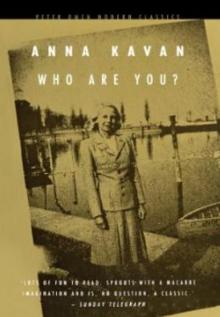 Who Are You?
Who Are You?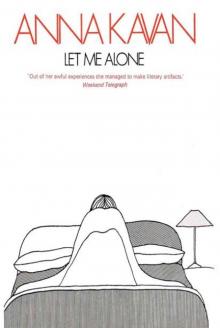 Let Me Alone
Let Me Alone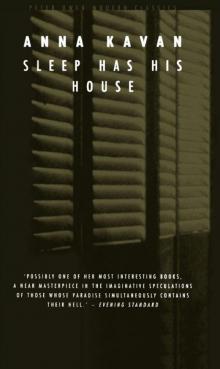 Sleep Has His House
Sleep Has His House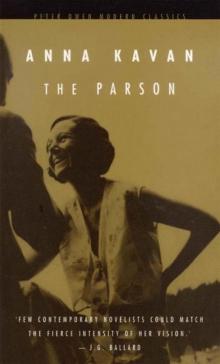 The Parson (Peter Owen Modern Classic)
The Parson (Peter Owen Modern Classic)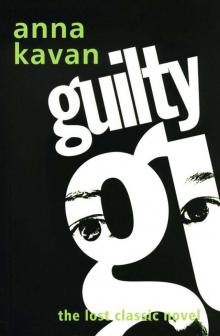 Guilty: The Lost Classic Novel
Guilty: The Lost Classic Novel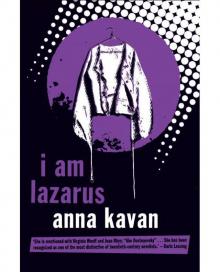 I Am Lazarus (Peter Owen Modern Classic)
I Am Lazarus (Peter Owen Modern Classic)